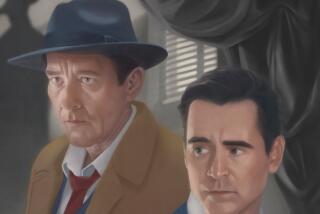A ‘Miserables’ Fit for Today
- Share via
It’s chichi in academia to reject the work of so-called dead white males, but despite what you might read, not all DWMs were defending the patriarchal status quo, or subjugating colonials, or writing in dialect.
Take Victor Hugo. Or, if you prefer a couple of hours to a couple of hundred pages, take Bille August’s adaptation of Hugo’s greatest work, “Les Miserables,” an eager, earnest, broadly constructed pageant of ideas and characters whose greatest asset may be the service it pays to literature.
Mine may be a strictly CNN-saturated American point of view, but watching the Danish director take the French novel and an international cast through their weighty paces, the sly parallels and commentary seem obvious. Jean Valjean (Liam Neeson), who serves 20 years in prison for stealing a loaf of bread, embodies all the modern arguments about poverty, rehabilitation, reinvention and redemption. The doomed factory girl Fantine (Uma Thurman), fired for having an illegitimate daughter, represents everything about sexual double standards, public morality and welfare. And frankly, if the relentless, obsessive, self-righteous and sanctimonious Inspector Javert (Geoffrey Rush) doesn’t have Kenneth Starr written all over him, I’ll eat my tri-cornered hat.
So, what you have in “Les Miserables” is what you didn’t have in the movie “Primary Colors,” which might have been a mirror of contemporary events, but settled for a gelatinous sense of right and wrong--as well as a story that was more smirk than substance. And although it’s an unwitting confirmation that original screenwriting is dead in Hollywood, “Les Miserables” certainly has a story. And, for the most part, a cast.
Thurman is good, but briefly seen (and seen in her briefs). As Valjean, the hardened convict who is forgiven by a priest he robs and is thereafter made a good man, Neeson is a monument--of penance, intelligence, charity. His physical presence, naturally, is a plus (although August underplays the cinematic potential of Valjean’s famous rescue of the man under the horse cart). But so is the sense of warring instincts that Neeson modulates so beautifully.
It’s Rush, however, who is the magnetic force here--darkness, as always, being so much more delicious--and his Javert, like Neeson’s Valjean, is a simmering cocktail of emotions. Less sneering and unctuous than Charles Laughton was in the 1935 film (“Les Miserables” has been filmed at least 20 times, in various nations and incarnations), Rush is more reminiscent of Cedric Hardwicke in the 1939 “Hunchback of Notre Dame”--half angel of rectitude, half vampire.
When Javert discovers he’s been right all along--that Valjean has become the owner of a prosperous factory and as mayor of Vigau defied him in the arrest and persecution of the hapless Fantine--he’s also a picture of glee.
*
The first half of the film, which includes Valjean’s flight, his rescue of Fantine’s daughter Cosette and their sanctuary in a Paris convent, is more involving than the latter, and this is due both to the story line and the casting. As the grown Cosette, Claire Danes again proves herself an interesting actress, but one whose emotional repertoire is beginning to seem mannered, even at her ripe young age. A more mature romantic partner might have helped, but as Marius, the political firebrand trying to get the July Revolution of 1832 out of the blocks, Hans Matheson is a callow ingredient.
August (“Pelle the Conqueror,” “Smilla’s Sense of Snow”) has less success orchestrating the large-scale scenes than he does the more intimate ones. This was evident in “Jerusalem,” his as-yet-unreleased-here version of Selma Lagerlof’s epic Swedish novel, and it’s evident here. Neither is he immune to the cringe-producing moment of Sturm und Drang and schmaltz and gingerbread. But at the same time he “gets” what Hugo was about, what the story has to say a century and a half later and, most important, why literary adaptations don’t always have to be exercises in sloth and convenience.
* MPAA rating: PG-13 for violence, and for some sexual content. Times guidelines: People fall at the barricades and characters get smashed about the head.
‘Les Miserables’
Liam Neeson: Jean Valjean
Geoffrey Rush: Javert
Uma Thurman: Fantine
Claire Danes: Cosette
Hans Matheson: Marius
Mandalay Entertainment presents a Sarah Radclyffe production, a James Gorman production, distributed by Columbia Pictures. Directed by Bille August. Screenplay by Rafael Yglesias based on the novel by Victor Hugo. Produced by Sarah Radclyffe and James Gorman. Co-producer Caroline Hewitt. Director of photographer Jorgen Persson. Production designer Anna Asp. Editor Janus Billeskov-Jansen. Costume design Gabriella Pescucci. Music Basil Poledouris. Running time: 2 hours, 9 minutes.
* In general release throughout Southern California.
More to Read
Only good movies
Get the Indie Focus newsletter, Mark Olsen's weekly guide to the world of cinema.
You may occasionally receive promotional content from the Los Angeles Times.










